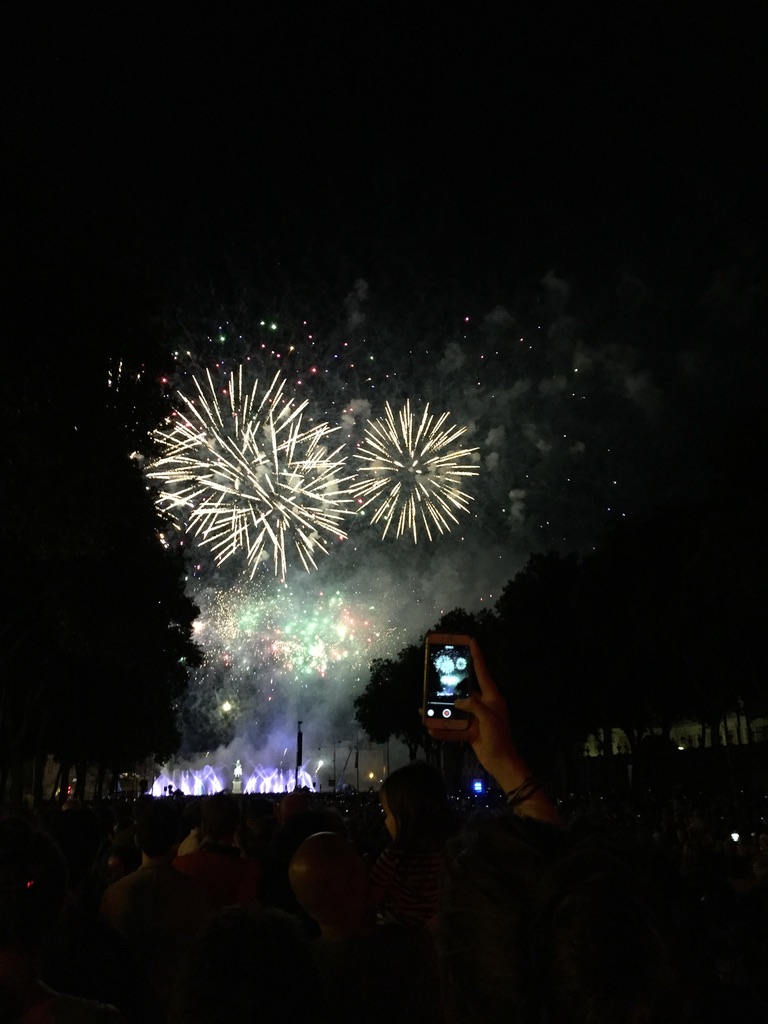
ELCOME back to writing4godot.

If you have ever driven in Paris, you will be shaking your head before you get to the end of this sentence. It makes NYC driving seem peaceful and orderly. Hence the best strategy is to light many candles to Saint Jude, patron saint of the impossible! Imagine six lanes of traffic going in one direction. Now erase all the lane markers. Drivers entering a traffic circle, say at Etoile, have the right of way. So here you are, driving along. You have to stop for anybody entering on the right, and then manage to avoid the traffic to your far left when suddenly one of the far lefties is scooting to the far right to exit on one of the spokes on the wheel that is Place de l’Etoile.
Here’s a view of l’Etoile when the yellow vests decided to give a hit of sunshine (sunburn in French) to this roundabout. Somebody hangs a message to President Hollande to adopt renewable energy.
ROUNDABOUTS
Now in France, roundabouts replace waiting at traffic lights. The GPS directs you in the following way: Enter the roundabout, the nice lady says. Well, what else could you do, go home? Then, to go straight, you take the second exit, assuming there is only one turn between you and the straight away. The problems really begin when you have to take the fourth exit, say, of many possibilities. You count, but you say to yourself, “Is that really a road, or is it heading to a parking lot?” Well, you take number four, and the GPS blithely tells you to turn here and there until you are right back where you started, having evidently missed the correct exit. In champagne country on tiny roads with too many roundabouts–and did I say at night? I think the GPS should say, “Good job,” once you have correctly guessed where you are going, guessed being the operative word! Your destination becomes like Godot. Elusive, unreliable, and something that may appear tomorrow.
And speaking of the GPS, it is really no help, unless you are a taxi driver. Every time I tried to drive from Versailles east, I either ended up in an expensive, low-lying tunnel from which you couldn’t exit or at a large shopping mall. To avoid that tunnel I wound up instead at Velizy II, that large shopping mall. We would carefully follow the signs, certain to 1) avoid the tunnel and 2) avoid the mall, only to find ourselves in the back parking lot of, yes, Velizy II. Or the side lot. Or the front door. Velizy II and the GPS surely have an arrangement to lure drivers into the mall for a small cut.
Repeatedly I wound up expressly where I didn’t want to go, despite everything. Although there was a lot of movement involved, this is akin to the stage directions in Waiting for Godot, where when somebody decides to move along, they do not move.
THE ABSURD
What I like about the absurd in Beckett’s play is the way the characters appear to be going someplace, but do not move. I like the outcome: going nowhere. The faint of heart will say, “Oh dear, depressing.” But I will say this is also a feint, a fencing move, designed to accommodate both tragedy and humor, perhaps the two poles of our existence. Beckett himself translated his own work from the French and subtitled only the English version, “A tragicomedy in two acts.”
One of several reasons I call this blog writing4godot is that so many of us writers are earnest. We read ten ways to get published and follow them scrupulously. And? Often no publication. I took a great workshop with novelist Dean Bakopoulos in Bantry, Ireland, where I complained to him about getting positive agent feedback about a manuscript called Whispers in the Borderlands, but no takers. “You’re too competent,” he said. Flash, stars! I got it. Too polished. Not raw enough with the irregularities of fruit put to the side in the grocery store. Too goal oriented, too publishing oriented.
As you see from the tentacles Velizy II sends out to capture unsuspecting drivers, being driven does not always get you going forward. (Unless of course you’re in an Uber.)
Liberation! Let’s stop trying to get anywhere.
You might say, “Well, isn’t that a goal?” or, “This is not helping.” So true and so apt. One or the other of the hobos in the play often says, “Let’s go.” And then there’s that pause after. That blink. That moment to ask, “Where are we going?” You could say the tramps are going nowhere, going in circles, going to hell in a hand basket. At least they are waiting. What are we doing?
One thing we are going to do today is celebrate the Fourth.
And because this day happens to be the 4th of July, a day celebrating America’s independence from Britain, I’d like to celebrate this in a literary way with a thought from John Steinbeck’s East of Eden, where he prizes the mind first and urges that we protect it from any encroachment.
“And this I believe: that the free, exploring mind of the individual human is the most valuable thing in the world. And this I would fight for: the freedom of the mind to take any direction it wishes, undirected. And this I must fight against: any idea, religion, or government which limits or destroys the individual. This is what I am and what I am about.”
— (Selected by Sadie Trombetta from Bustle, 04 July 2017)
Happy Fourth of July! BTW I borrowed this photo from one I took at the gardens of Versailles on Bastille Day. I haven’t been home for the fourth in a hundred years since that’s often the day of graduation and the prom at the French school where I taught. Yes, our last day was in early July!!
(Will she still talk about driving next Friday?)

And this is from one of the grand boulevards facing the Chateau on a different 14 July.
